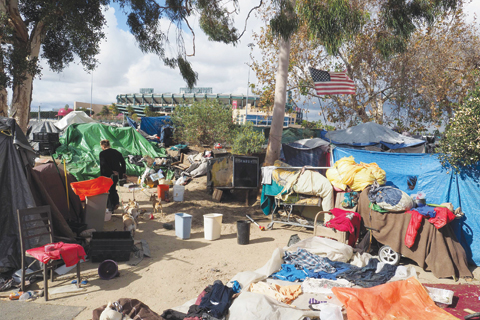 CALIFORNIA: A homeless encampment made of tents and tarps lines the Santa Ana riverbed near Angel Stadium in Anaheim, California. —AFP
CALIFORNIA: A homeless encampment made of tents and tarps lines the Santa Ana riverbed near Angel Stadium in Anaheim, California. —AFP
LOS ANGELES: Since learning that the California homeless camp where she lives will be dismantled, Ashley Foster has had three serious epileptic seizures. The 23-year-old lives on the banks of the Santa Ana River in Anaheim with 500 other people who recently learned they must pack their bags and move on-though many worry there are no adequate measures in place to ensure the homeless will find shelter. "They're trying to scare us, to have us leave," said Foster's tent neighbor Jodi Samhat, tears streaming down her face behind her sunglasses.
The 34-year-old has nowhere else to go. Four years ago, she lost her corporate sales job after mass layoffs. She subsequently was unable to afford her condo-and is now penniless with alcohol and drug addiction issues. Samhat is one face of the chronic homelessness crisis in California, home to more than a quarter of an American homeless population that has swelled past half a million, despite the coastal state's booming economy and lion's share of billionaires. In cities like Anaheim as well as Los Angeles, San Diego and San Francisco, more and more people are sleeping in cars, tents, under bridges or in parks-often just steps away from luxe restaurants and lofts.
Many are veterans, people suffering from mental illness, or others who found their lives upended after losing a job. Aid authorities say they have been more active than ever, initiating emergency plans worth hundreds of millions of dollars. Urban development network CityNet says it has helped some 200 people get out of the Santa Ana camp since July-but the steady stream of new homeless people is relentless. A lot of people are "living on the edge," said Matt Bates, the organization's vice president. "They're one paycheck away or one tragedy away from falling out of housing." "There's a lot of anxiety and fear of the unknown," he added.
'No magic wand'
Anaheim city spokesman Mike Lyster emphasized that the Orange County officials in charge of the area are "not forcing people today or tomorrow-but the time will come when they have to leave." "There is no quick fix; there is no magic wand here," Lyster said. Like many people in her tent city, Samhat has applied for low-income housing. But many of them wait for their chance in vain: it can take years to snag a spot. And some prefer to stay on the streets rather than go to shelters, citing overcrowding, insecurity and rules against living as a couple or bringing pets. "My dogs, they're like my kids, they got me through everything in my life," Tammy Schuler said. Sick of seeing municipal employees toss her personal belongings, she sued Orange County with help from non-profit aid workers.
She won the right to stay on the condition that she keep the vicinity around her tent clean. But the city of Anaheim-one of California's richest, thanks to Disneyland-has justified its planned evacuation with complaints of local residents and the risk of flooding, though it rarely rains in the area. The growth of encampments has triggered an increase in crime in some areas of California, as well as a Hepatitis A epidemic. A cooking fire in one Los Angeles camp also recently sparked a blaze that swept through one of the city's most affluent areas-underscoring the need for authorities to address the homelessness crisis.
Eve Garrow, a homelessness policy analyst with the American Civil Liberties Union, blames municipal officials for not investing in affordable housing. "It's a matter of a lack of responsiveness from the county and the city," she said, denouncing fines suffered by homeless people who are pushed out of tent cities only to set up camp elsewhere. "Access to affordable housing is basically impossible," she said. "Every level of government has failed these people." Bates of CityNet agreed, saying "the resources exist here to solve this problem-to provide housing to the thousands of people here that are homeless." "It's a question of public will," he said.- AFP




